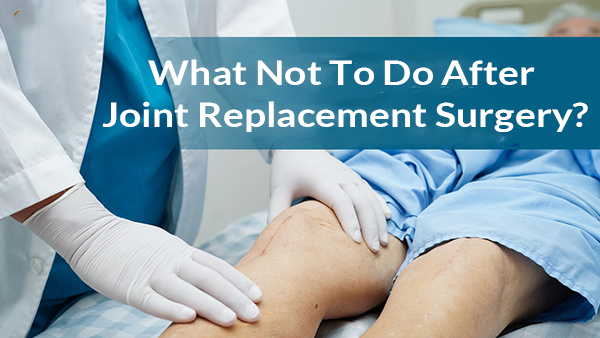When it comes to joint replacement surgery, the doctors replace parts of injured or worn-out knee joints. During the course of joint replacement recovery, avoiding certain behaviors and activities is essential for a safe and speedy recovery. Following proper recovery guidelines can reduce the chance of developing complications. While you must essentially adhere to the recommendations of your medical professional and surgeon; we covered a few things that you must avoid after your joint replacement surgery.
7 Common Mistakes To Avoid After Joint Replacement Surgery
Doing Too Much Too Soon
The patient must understand that healing is a process and every person has their own recovery speed. Doing too much at once could slow down your recovery, causing excessive discomfort or pain. We advise you to be patient, follow your recovery plan, and speak with your doctor about resuming your routine activities.
Getting Lenient with medications and proper care for wounds
A proper wound care regimen is essential to prevent infection and complications that can delay recovery. The doctors provide complete care instructions to the patients about how to treat the wound and how to keep it dirt free. Moreover, you must be careful with your medications to ease pain or address any health issues as prescribed for recovery.
Not Bothering For Complications Signs
The patient must be vigilant for any signs of possible complications, like increased swelling, redness or a warm sensation in the knee joint. All these can be a sign of infection. Other symptoms like chest discomfort, breathlessness or swelling in the calf can indicate an underlying blood clot. Ignoring these symptoms and failing to get medical assistance immediately could lead to serious health problems.
Ignoring discomfort or pain
Some kind of pain is a natural aspect of healing; however, paying attention to how your body feels is essential. You must visit your doctor if you experience extreme or constant swelling, pain or other unusual symptoms. Ignoring these signs can cause infections or complications.
Skipping on your physiotherapy or joint exercises
Rehabilitation exercises suggested by your doctor have a crucial role for your joint replacement recovery. We understand that you might resist joint movement if it’s painful, but it’s crucial to keep going. Maintaining your mobility throughout the weeks and months following surgery can help with speedy recovery and improved mobility. You might consider introducing some gentle exercises after consulting with your medical professional.
Rushing the recovery process
It’s normal that you wish to return to regular activities as quickly as possible after your joint replacement surgery. However, always remember pushing yourself too hard and fast could cause harm. You must abstain from activities that stress your joints, like running, high-impact activities or lifting heavy weights until your doctor advises you.
Avoid Using Assistive Devices
Assistive devices help during the initial phases of joint replacement recovery. Removing them prematurely can cause problems with balance and put excessive strain on your joints. You must gradually reduce using devices as your balance and strength improve under the supervision of a medical expert. Also, make sure that your devices are correctly adjusted to meet your needs for optimal assistance.
Alcohol consumption and smoking
There may be chances that smoking may hinder the healing process by reducing blood flow and putting you at risk with complications. Moreover, excessive alcohol consumption can affect the recovery process, raising the likelihood of accidents or falls. Thus, we advise you to stay clear of smoking and reduce alcohol consumption while recovering.
Needs For Speedy Recovery
Listed below are a few things to need to ensure for speedy recovery of your joint replacement:
Prioritize recovery: Returning to your routine activities should be your top priority. This means performing workouts with proper professional guidance and focus on building your mobility and strength.
Healthy diet: A healthy diet is essential for overall health and healing during joint replacement surgery. We recommend eating a healthy diet containing vegetables, fruits, lean proteins and all-grains. Healthy protein intake along with iron consumption helps to support tissue repair and healing.
Regular physical therapy: Attend regular physical therapy sessions to ensure that your recovery process is on the right path. This includes exercises designed to gradually improve joint functioning and reduce pain.
Use Ice packs to lessen swelling: You can apply ice packs following the surgery to help reduce swelling and pain. Apply the cold compress for around twenty minutes several times a day until swelling reduces. You can seek advice from your doctor for better assistance.
Assistive devices: Doctors might suggest using assistance devices like crutches, canes or walkers. Using these devices correctly will prevent falls and help in recovering.
Monitoring progress: The continuous evaluation performed by physical therapists allows adjustment of the workout routine depending on the patient’s recuperation speed and demands.
Wrapping Up!
We tried our best to cover every relatable aspect about things you must avoid after your joint replacement surgery. The recovery process demands paying attention to your body signs, adhering to your physical therapies and avoiding activities that may hinder your recovery.
If you wish to seek more assistance regarding joint replacement surgery, the experts at Gadge Hospital can help you. The team of experienced doctors are committed to provide assistance throughout your recovery process. From assisting pain relief to giving advice on exercises, these medical professionals can be your best supporters to speed up your recovery process.
Every recovery journey is unique. Contact us today for the best Joint Replacement assistance.
